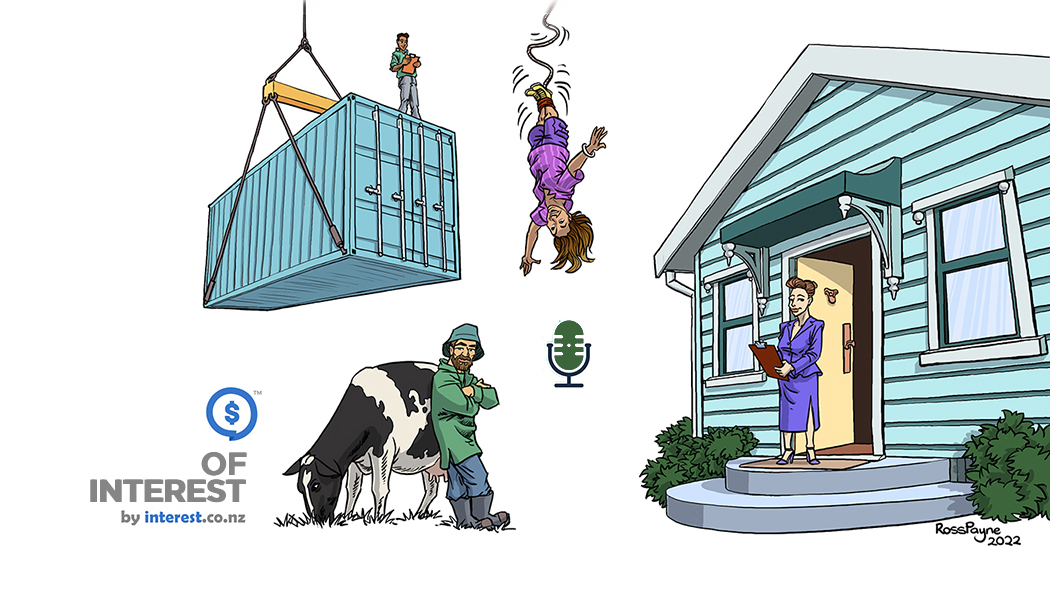
By Gareth Vaughan
Money laundering is a scourge of the modern financial world. Whether it's the actual dirty money stretching its tentacles and influence widely, or the US$210 billion annual tick-box compliance effort as people and companies strive to meet anti-money laundering laws, the impact is massive.
In a new book, The War on Dirty Money, authors Nicholas Gilmour and Tristram Hicks detail the failings of the fight against money laundering and offer solutions designed to make the war more winnable.
Speaking to interest.co.nz for the Of Interest podcast, Gilmour describes dirty money as all money deriving from crime, and money laundering as a series of transfers and purchases as criminals strive to distance the money from the crime. The war against dirty money needs a better global response, says Gilmour, with New Zealand one of hundreds of countries where dirty money sloshes around.
Hicks points out the horrendously high death toll from the recent Turkish earthquake involves a "straight forward link" between corruption, dirty money and the loss of life because of corruption around building standards.
So is the war winnable?
"We think it is [but] it's going to be a difficult war to win. This is a global problem, it requires a global solution. But it is winnable and it's winnable in small increments. It's not going to be easy and it's going to mean that some people have to change their mindset completely, do a 180 degree change in their mindset," says Gilmour.
"The Financial Action Task Force [the global money laundering and terrorist financing watchdog] only looks at countries, it doesn't look at illicit financial flows between countries. We think that it could do that and we've proposed a way of doing it," Hicks adds.
Gilmour, now a consultant/advisor working with governments and the private sector on financial crime, analysis and intelligence sharing, previously worked for the NZ Police Financial Intelligence Unit. Hicks is an advisor on the operational effectiveness of asset recovery and criminal justice anti-money laundering regimes.
You can find all episodes of the Of Interest podcast here.

12 Comments
No one wins the war on money because money makes everyone corrupt.
"Every man has their price. And the honest man has the highest price of them all"
There are incorruptible people. Hard to believe for the dishonest ones.
“The bureaucracy is expanding to meet the needs of the expanding bureaucracy.”
No mention of a primary driver of AML - the USA Govt double taxing the income of it's passport holders no matter where they live in the world.
This one is a really tough nut to crack. The more the authorities try to win it, the more (layers of) regulations they install, the closer we get to the ''big brother full control'' model as Huxley described it. In winning this battle we lose our individual sovereignty evermore each day, by creating this damned if we don't & damned if we do scenario.
Technology allows this to evolve in the authorities favour over time, which for me, is a sad comment on our humanity today. Pretty much everywhere you look these days you find corruption of one form or another, even within the authorities (although many would recognise this as incompetence, deliberate incompetence is also corruption.)
The investment in ourselves - ie: education - has been in a consistent terminal decline for nearly 50 years (to my knowledge) creating an inability to see what we're doing to ourselves. This is happening right across our society both as a whole & the sub cultures within it, to the point where we are literally unable to govern ourselves for the better (of ourselves) & indeed, have created a moment where (in many places) the current generation is now worse off than the previous generation, even though way more people possess way more knowledge & have way more stuff than so many people have ever had before.
So why is this?
Well...
Our nuclear family structure has been disassembled (even in law) & our relational fundamentals have been undermined (from within our educational institutions) which when combined with the ability to up & move sticks from one side of the planet to another (whilst having its attractions) leads to a dismembering of our societies in ways never seen before. This helps create neigbourhoods of strangers where once stood communities of shared values & common issues (localisms) & replacing it with social media nastinesses & endless bickering amongst people (strangers) who look familiar & sound familiar, but when one digs a little deeper, are often folk who have just arrived & have recently moved away from their previous dysfunctional cultures from down country, or worse, have their own dysfunctional personal issues that they bring with them, as moving physically means they won't have to address or change these issues for the next few years, as their new culture won't notice their shortcomings (for a while at least) so they can continue their sub-par humanity lifestyles for a little while longer, in their new cultures.
There's more but that'll do for today.
I enjoyed reading that even it was tinged with xenophobia and rosy retrospection. Keep going…
Let's see if any of the "let's get tough on crime" parties are in favour of making corruption in office a capital offence. Nothing like politicians going to the guillotine to make them think twice before selling out their own country.
In this day and age nothing is seen as being worth the the guillotine anymore. Corruption is considered small fry on the scale of crime.
Small fry maybe,..& of course traditional Kiwi corruption was just "mates' rates, ....fell off the back of a truck,...."homers, done by mates in the naval dockyard/railway workshops,...etc.." But these days I suggest we face the perfect storm with a combination of large numbers of immigrants from countries where tucking a $50 bill in the top pocket is normal, plus an increasing trend whereby legislation is passed authorizing various government agencies to self fund via 'user charges'. I mean how common it is these days to approach your local council to obtain a building consent to add a room or construct a shed or carport, to be told..."well the fee to approve such will depend on complications...geo-tech reports/Iwi consultation, etc.,....give us, say a thousand bucks and we will let you know if we need more....or give you a refund." (Yeah right!) I call that money laundering.
These days we see an increasing number of prosecutions for tradies back- handing consent & contracting authorities. So maybe not large scale money laundering but definitely NZ is no longer the naively honest society it maybe once was.
The relatively new Financial Market Authority is supposedly at the forefront of money laundering policing, but it's own processes represent a form of extortion whereby it gains its major income from auditing banks and other financial institutions, but how vigorously is it pursuing the lower level criminals who need to legitimise their proceeds from crime? We all have to go through b...s to open another bank account term deposit, but do gangs really worry about converting crime cash to legitimate "clean" money? I think not!
I would reserve capital punishment for elected officials. Hypothetically speaking, imagine if it was discovered some of the $400m sales commission for selling the state assets (despite a referendum rejection) was traced back to elected politicians who sold the assets. I would want them hung for that.
The banking system are actively involved in laundering ~$1/2 trillion and foldable cash every year from the drug trade alone. It is not a scourge of the modern financial world - it is profitable revenue stream. You can't hide $1/2 trillion under mattresses - without the banking system/elites it couldn't happen.
"So rampant was the practice, prosecutors said, that on some days drug traffickers deposited hundreds of thousands of dollars at HSBC Mexico accounts. To speed things along, the criminals even designed “specially shaped boxes” that fit the size of teller windows at HSBC branches, according to the documents."
https://www.reuters.com/article/us-hsbc-probe-idUSBRE8BA05M20121212

We welcome your comments below. If you are not already registered, please register to comment
Remember we welcome robust, respectful and insightful debate. We don't welcome abusive or defamatory comments and will de-register those repeatedly making such comments. Our current comment policy is here.